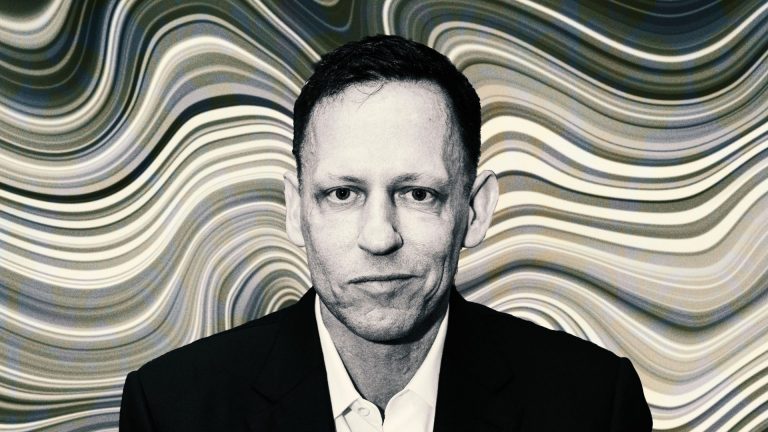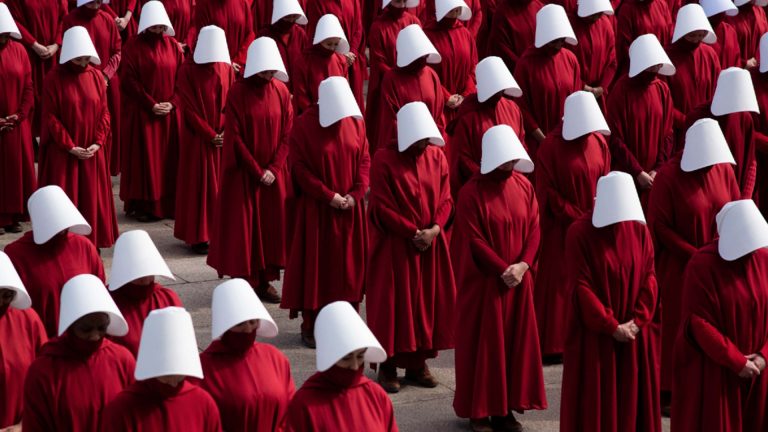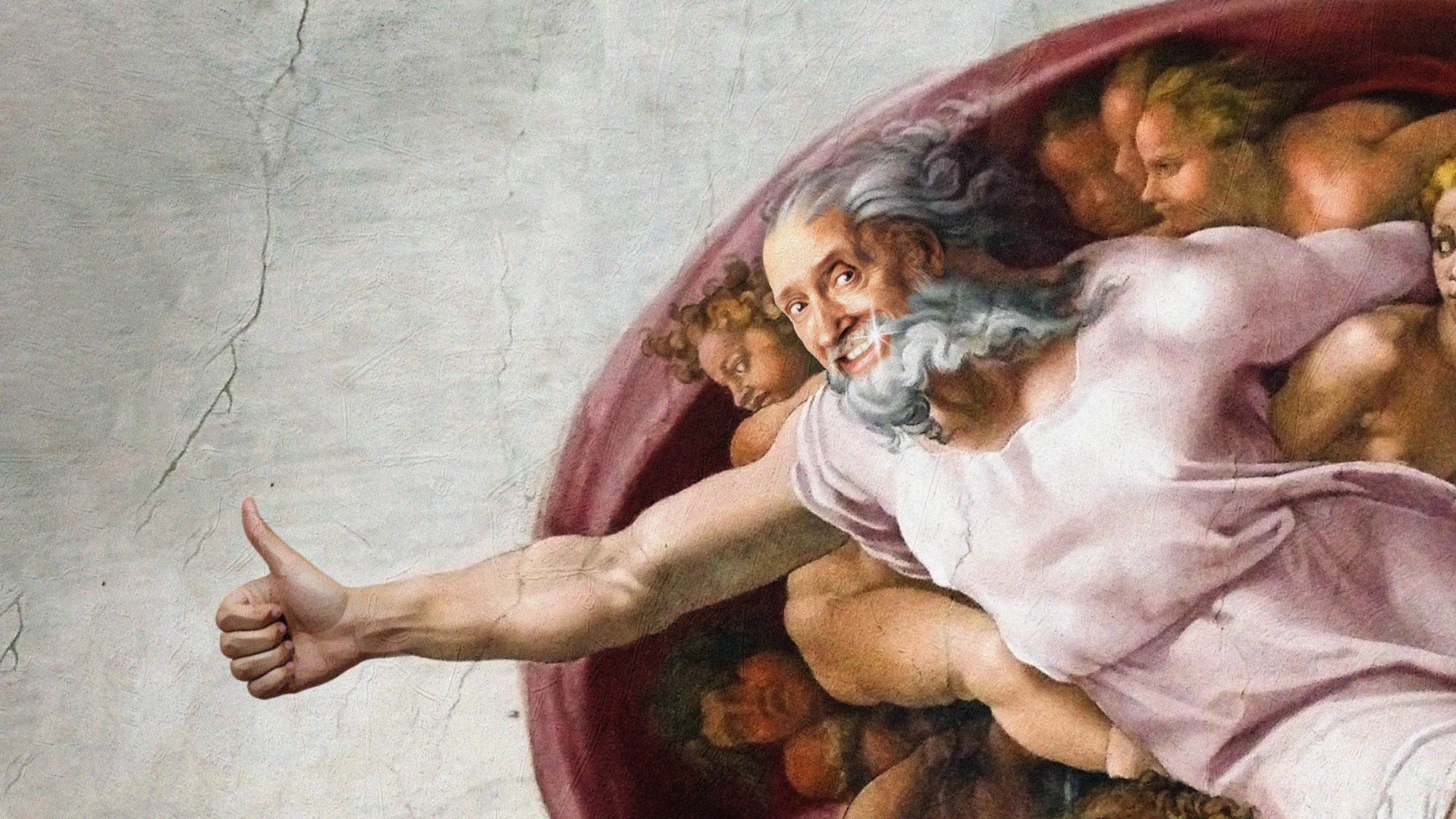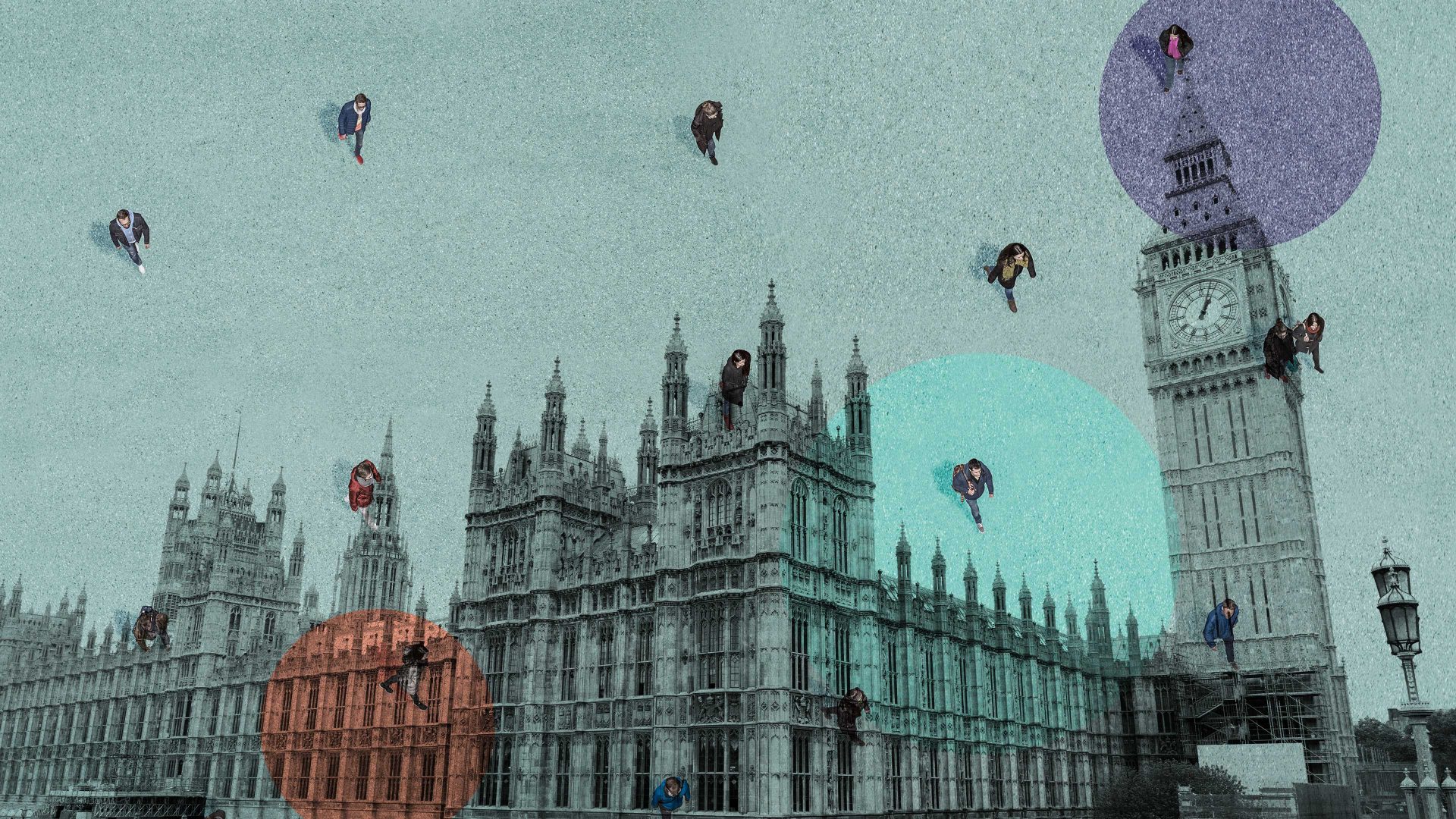I don’t think this relationship is working. It’s my sixth day on the Hallow app, and I’m listening to Mark Wahlberg reciting the Rosary: “Hail, Mary, full of grace, the Lord is with thee. Blessed art thou amongst women and blessed is the fruit of thy womb, Jesus…”
The last time I heard Wahlberg’s voice was earlier this year in the truly terrible action thriller Flight Risk. I also can’t stop thinking of his very funny lines in the Ted movies. I am sure his faith is sincere. But, you know… would God really choose Marky Mark as his messenger?
There’s no shortage of content on Hallow (an annual premium subscription will set you back £59.99): daily gospel readings (the Lectio Divina); chant playlists; radio stations ranging from “Praise & Worship” to “Christian Hip-Hop”; scriptural games; audiobooks, if you fancy listening to St Augustine’s Confessions while you’re on the go; and (my personal favourite) folk worship with the Hillbilly Thomists.
And to be fair to Hallow, which was launched in 2018, I am hardly the target audience: a lifelong atheist, patron of the secular campaign group Humanists UK, and a former trustee of the Science Museum Group. Financed by investors including JD Vance and the tech mogul Peter Thiel, the app claims to have achieved 23m downloads in more than 150 countries. It has partnerships with a growing cohort of celebrities including Chris Pratt, Gwen Stefani and Jonathan Roumie (star of the hit Christian drama series, The Chosen). In February 2024, it reached the number one spot in Apple’s App Store.
Because the subtle continuum of faith is resistant to the kind of questions that statisticians ask, polls of religious conviction always need a health warning. But for what it is worth, there are also signs in these surveys of what the British-based Bible Society has called “The Quiet Revival”.
According to a YouGov poll published by the society in April, the resurgence of faith is especially marked among the young. In 2018, 28% of 18- to 24-year-olds said there was probably or definitely a God or “higher power”. By 2024, the proportion had risen to 45%. Over the same period, the percentage of young churchgoers reportedly increased from 4% to 16%.
A similar generational shift has been observed in the US. In February, the Pew Research Center showed that the steady decline in religious belief had stalled and that American Gen Z-ers – especially men – were more likely than millennials to attend church. In France, 17,000 people were baptised as Catholics over the Easter weekend: the highest number for 20 years.
If God is back, however, he is returning in podcasts not pews, chatbots not chasubles. Fr Mike Schmitz’s The Bible in a Year has twice been the most popular podcast on Apple. The Bible Recap Podcast, hosted by Tara-Leigh Cobble, has been downloaded 300m times.
Even a heavy-going series like Jordan Peterson’s 16-part study of Exodus can rack up more than 740,000 views on YouTube. Joe Rogan, the world’s most successful podcaster, recently announced that he has started going to church.
For those in search of instant spiritual answers, there is Jesus AI, Christian AI, BibleGPT and FaithGPT. Luckily, Hallow has its own in-app AI service, called “Magisterium”.
I ask the holy ghost in the machine: “Isn’t this all superstitious nonsense?” It is unimpressed. “The Catholic Church understands faith not as “superstitious nonsense,” it chides me, “but as a reasonable assent to truths revealed by God which are interpreted by the Church’s Magisterium. This understanding emphasises a harmonious relationship between faith and reason, rather than a contradiction.” There it is – my first ticking-off by a robot-priest.
In the poem Dover Beach (1867), Matthew Arnold heard the “melancholy, long, withdrawing roar” of the “Sea of Faith”. If only he’d had an iPhone; or at least taken comfort in the extraordinary capacity of religion to adapt to and make use of new technology. The basis of the Protestant Reformation, after all, was the printing press. Now there is a flourishing genre of “Godcasts” and AI that busily promulgates faith rather than science or rationalism.
How long ago the era of “New Atheism” now seems. In response to 9/11 and the demands of Christians in the US that creationism be taught in schools, a quartet of public intellectuals – Christopher Hitchens, Sam Harris, Richard Dawkins and Daniel Dennett – joined forces to combat what they regarded as a clear and present danger to liberal democracy and the scientific revolution. They agreed with the physicist and philosopher, Victor Stenger: “Science flies you to the moon. Religion flies you into buildings”.
All of the so-called “Four Horsemen” published acclaimed books: Harris’s The End of Faith: Religion, Terror, and the Future of Reason (2004); Dawkins’s The God Delusion (2006); Dennett’s Breaking the Spell: Religion as a Natural Phenomenon (2006); and Hitchens’s God is Not Great: How Religion Poisons Everything (2007).
Suggested Reading


Peter Thiel and the Antichrist
Then, on September 30, 2007, the quartet met at Hitchens’s apartment in Washington DC and discussed its campaign. You can watch their lively debate on YouTube or read the published transcript. The horsemen’s exchange – witty, erudite, amicably contentious – still resonates with me. But it is striking that, as the conversation draws to a close, Hitchens, who died in 2011, warned that, though they seemed to be “winning an argument that’s been neglected for too long… in global terms I think we’re absolutely in a tiny, dwindling minority that’s going to be defeated by the forces of theocracy”.
It is certainly true that monotheistic religions have continued to grow. A third of all babies born are now counted as Christian, especially in the global South. The Muslim population is projected to increase by 70% between 2015 and 2060.
On a smaller scale, Sikhism, still concentrated in India, is expected to be followed by 42 million people by 2050. Judaism (not to be confused with Jewishness, which is an ethnicity) is growing slightly, thanks in part to the high birth rates of Haredi and Orthodox communities. Like Sikhs, believers in Judaism do not seek to convert non-believers – unlike Christianity and Islam, which are proselytising religions.
For many of its admirers, the high season of the New Atheism was a philosophical counterpart to Francis Fukuyama’s “End of History” thesis: a completion of the Enlightenment movement of the 17th and 18th centuries that had hailed the liberation of humanity from the shackles of superstition and faith.
It was, of course, no such thing. For a start, those who came after the four horsemen were incompetent legatees, misreading their challenge as the foundation of a new belief system rather than – what it actually was – a passionate call for individual free thinking, scepticism and rationalism.
In 2011, the fledgling movement was rocked by an early #MeToo controversy, in which Rebecca Watson, the founder of the website Skepchick, complained that she had been propositioned in the hotel lift by another delegate at the World Atheist Convention in Dublin.
Meanwhile, a breakaway faction – calling itself “Atheism+” – tried to graft social justice values on to the absence of religious faith. This was one of the first manifestations of what became known as wokeness.
In a spectacular irony, the Great Awokening was notable for its religiosity. No less than traditional faith systems, the new social justice movements developed a taste for the persecution of heresy; an insistence upon absolute doctrinal obedience; the 21st-century version of excommunication that is “cancel culture”; and “speech codes” that were, in practice, blasphemy edicts.
The greatest sin of all was to cause offence. And this, in turn, nurtured the chilling effect upon culture in general which means it is all but impossible to imagine Monty Python’s Life of Brian (1979) being greenlit today, or Salman Rushdie’s The Satanic Verses (1988) being published.
At the same time, the accelerating convergence of politics and religion that Hitchens predicted in 2007 is visible everywhere. Vladimir Putin’s autocratic regime takes explicit inspiration from Russian Orthodoxy. “Christianity was a powerful spiritual unifying force,” he said in his annual address to the Federal Assembly in 2014, “in the creation of a Russian nation and Russian state… It was thanks to this spiritual unity that our forefathers for the first time and for ever more saw themselves as a united nation.”
I have written often of Donald Trump’s debt to Christian nationalism and his exploitation of apocalyptic fervour – especially since he narrowly escaped assassination at Butler, Pennsylvania, in July 2024 (“I mean, the only thing I can think is that God loves our country. And he thinks we’re going to bring our country back… It has to be God”).
In India, the US president’s fellow strongman leader Narendra Modi has surfed a wave of violent Hindu nationalism. In Argentina, Javier Milei oscillates eccentrically between Catholicism and Judaism. In Hungary Viktor Orbán, a Reformed Calvinist, has declared that the defence of “Christian Europe” is the basis of his conservative social values, opposition to immigration and the battle against “confusion, turmoil, a new anarchy, signs of a new Babel everywhere”.
In this country, TNW’s own Alastair Campbell established the convention that still generally applies when, as Tony Blair’s head of strategy and communications, he ruled: “We don’t do God”. Keir Starmer is an atheist. In an interview with the BBC’s Amol Rajan last week, Kemi Badenoch revealed that she had lost her Christian faith upon learning of the horrors of the Josef Fritzl case: a rejection of theodicy, the argument that great human suffering is consistent with the existence of God.
Suggested Reading


Welcome home to Gilead
Still: watch this space. The new Reform UK-aligned thinktank Centre for a Better Britain is chaired by James Orr, a devout Christian and associate professor of philosophy of religion at Cambridge, whom Vance calls his “British sherpa”.
Blessed are the boat-stoppers? Under his eye, Nigel? I doubt that we will see Reform embrace an overtly Christian agenda. But anyone who has witnessed the fervour of middle-class families attending a Jordan Peterson arena event in this country, or a summit of his Alliance for Responsible Citizenship, or a National Conservatism conference in London can attest to the changing ambience of the British Right and – at minimum – its increasingly confident cultural Christianity.
Whether or not He exists, God certainly refuses to die. He has survived the challenges of Copernicus (the Earth is not the centre of the universe); René Descartes (philosophy is based on reason); Charles Darwin (humanity was not created, but evolved); Ernest Renan (the scriptures are fallible historical texts to be analysed like any other); Sigmund Freud (free will is what we call the promptings of the subconscious); and Karl Marx (everything can be explained by scientific materialism).
In 1882, Friedrich Nietzsche wrote that “God is dead” – dreading what might come next. After the atrocities of the mid-20th century, Time magazine ran a cover in April 1966, asking, in large red lettering on black: “Is God dead?”
Yet the very dislocations, terrors and global instability that continue to prompt this question seem, increasingly, to yield the answer: “No”. In his recent book, Believe: Why Everyone Should be Religious, the New York Times columnist Ross Douthat argues that it was always a mistake to imagine that the great religions were merely “a way station on an unstoppable march from pervasive supernaturalism to disenchanted secularism”.
It is hard to argue with Douthat’s claim that “already the time of the new atheism is passing; already mystery and magic and enchantment seem to be rushing back into the world” and, more to the point, that “[w]hen intellectuals stopped taking mystical experiences seriously, actual human beings kept on having the experiences.”
Implicit in this is a reproach to liberalism and progressivism that, candidly, is well-deserved. As a thought-system, liberalism demands a constant readiness to apologise but is allergic to anything that smacks of rootedness, tradition, or patriotism. In contrast, faith offers drama, redemption, purpose, identity.
In a world of convulsive change, which of the two is likely to hold more appeal? Until secular progressives offer a map of meaning and a narrative that amounts to more than technocracy wrapped in timidity, this will be a one-sided contest. As presently configured, the secular liberal worldview is simply too bloodless for the contemporary psyche.
Perhaps those Deists who argue that God is often absent are right. In which case, Mark Wahlberg is always with us, but the deity isn’t. Either way, it is impossible to prove a negative.
So my continued atheism rests on the proposition that belief in something for which there is no evidence is logically absurd. I agree with Dawkins that “the feeling of awed wonder that science can give us is one of the highest experiences of which the human psyche is capable.” I agree with Hitchens that “Human decency is not derived from religion. It precedes it”.
That said, I freely admit that such arguments are no longer in the ascendant (if ever they truly were). On the digital beach, I stay alert for rationality, humanism and secularism wherever they may be. But – for now, at least – all I hear is their melancholy, long, withdrawing roar.




